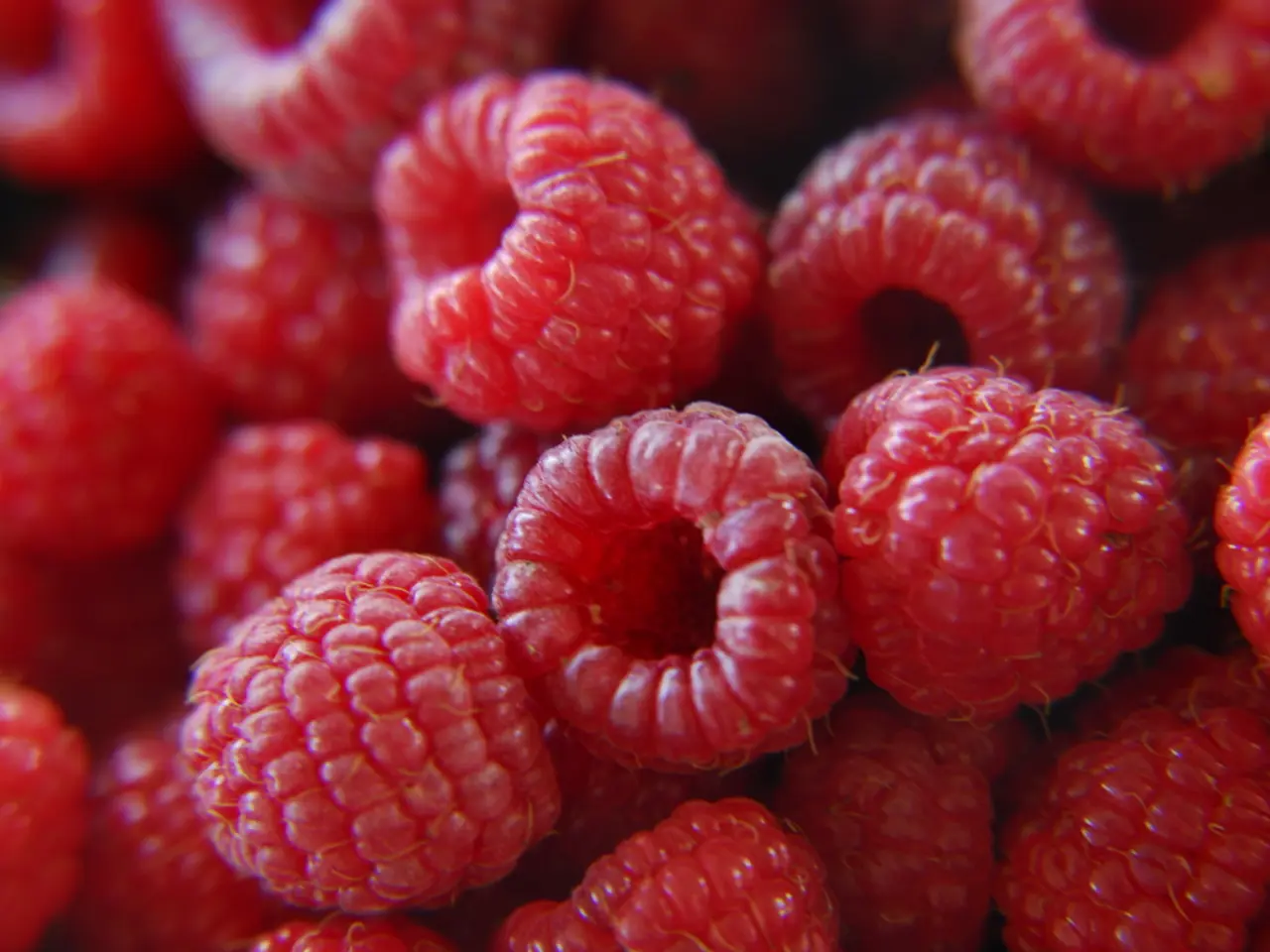Harvesting Wild Black Raspberries: Creative Usage Ideas
Black Raspberries, scientifically known as Rubus occidentalis, are a fascinating fruit native to eastern North America that have gained recognition for their culinary delights and medicinal properties. These luscious berries, with their distinctive taste, are not only edible but also prized for their nutritional value and health benefits.
The black raspberry plant is characterised by its compound, alternately arranged leaves that are medium to dark green above and pale, whitish, or silver below. Each leaf is composed of three or occasionally five leaflets, roughly egg or heart-shaped with double-toothed edges, and the underside of the leaves is hairy. The plant's stems form multiple long stems or canes from a center cluster, which may reach up to 10 feet long but usually only reach 4 feet or less in height due to their arching, drooping nature. These stems have a noticeable whitish bloom over them, and the first-year canes are usually light green or blue-green but often become reddish in their second year.
Black Raspberries can be found growing wild in eastern North America, particularly in disturbed habitats such as recently logged areas, meadow edges, streambanks, railroad beds, trails, lakes, and roadways. The flowers, which are white and about 1⁄2 inch in diameter, usually have five petals surrounded by five pale green to gray-green sepals that spread or curve downward. Black Raspberry berries, high in antioxidants, vitamins A, B, C, and E, minerals, and volatile oils, are the fruit of the plant and are prized for their taste, eaten fresh or cooked.
Beyond their edibility, black raspberry extract offers several medicinal benefits. The extract is a potent source of antioxidants that combat oxidative stress by neutralizing free radicals, helping prevent cellular damage linked to aging, cancer, cardiovascular diseases, and neurodegenerative conditions. Its antioxidant activity also contributes to reducing the risk of chronic illnesses and slowing premature aging.
The extract contains anthocyanins and polyphenols that help modulate inflammatory pathways and reduce chronic inflammation, a root cause of many diseases. This anti-inflammatory action helps the body maintain healthy immune responses without overdrive. Studies have also shown black raspberry extracts exhibit antibacterial properties that target harmful oral pathogens without damaging healthy cells, suggesting they might also help in controlling infections, particularly in the oral cavity.
Black Raspberry Seed Oil, derived from the extract, is rich in multiple forms of Vitamin E, omega-3, and omega-6 fatty acids. These components help protect the skin from environmental stressors, improve hydration, elasticity, and skin barrier function, and promote repair and rejuvenation. The oil is lightweight and suitable for sensitive and acne-prone skin, making it valuable in anti-aging and skincare formulations.
The canes have widely spread sharp, curved, broad-based thorns, adding to the plant's distinctive appearance. Black Raspberries have been studied for their potential to prevent and treat cancer, particularly oral, esophageal, and colon cancer. With emerging evidence supporting its use in immune support, infection control, and skin health beyond simple nutrition and edibility, the medicinal value of black raspberries continues to be a subject of interest and research.
In summary, black raspberry extract is valuable medicinally for its anti-inflammatory, antioxidant, antibacterial, and skin-protective properties, with emerging evidence supporting its use in immune support, infection control, and skin health beyond simple nutrition and edibility.
- Foraging guides often include Black Raspberries, a wild edible plant native to eastern North America, due to their medicinal properties and culinary delights.
- In the fashion-and-beauty world, Black Raspberry Seed Oil, rich in Vitamin E, omega-3, and omega-6 fatty acids, is gaining popularity for its skincare benefits, specifically its ability to protect the skin, improve hydration, and aid in repair and rejuvenation.
- In the realm of food-and-drink, black raspberry berries are loved for their distinctive taste and high nutritional value, with antioxidants, vitamins A, B, C, and E, minerals, and volatile oils contributing to their health benefits.
- In home-and-garden settings, the black raspberry plant, with its striking appearance of compound leaves and sharp, curved thorns, can add an interesting touch to a garden or landscape.
- Travelers exploring eastern North America might stumble upon Black Raspberries growing wild in disturbed habitats, offering a chance to connect with nature and enjoy a taste of the local flora.




